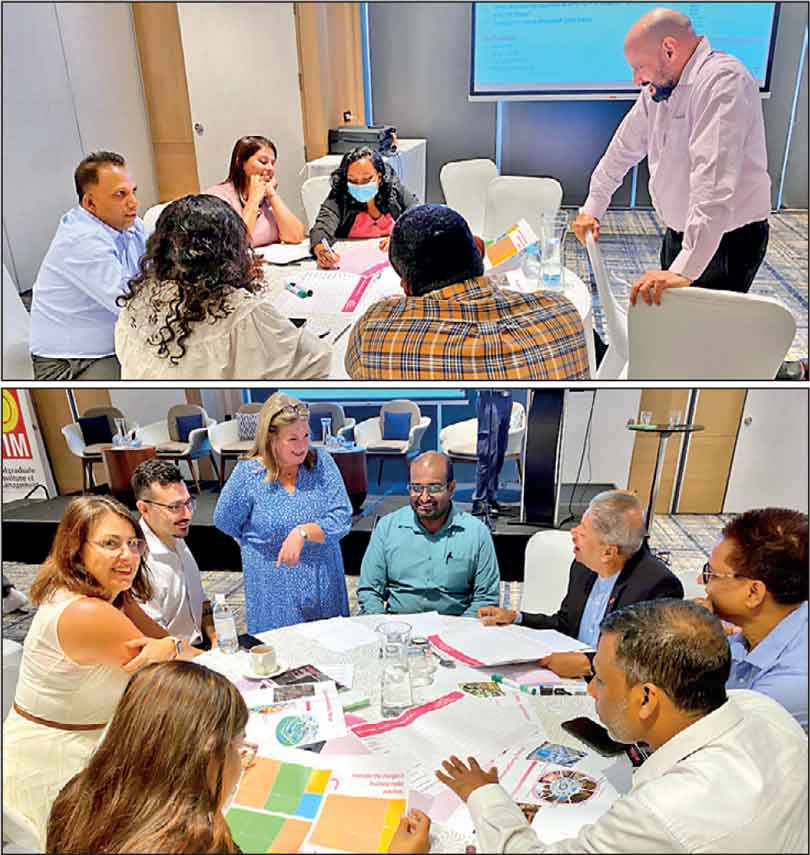Friday Feb 20, 2026
Friday Feb 20, 2026
Monday, 3 March 2025 04:35 - - {{hitsCtrl.values.hits}}

From left: Panellists KPMG Sri Lanka Principal Partner Pyumi Sumanasekara, Sustainable Development Council Director General/CEO Chamindry Saparamadu, MAS Holdings Director Group Sustainable Business Nemanthie Kooragamage, Gayan Ranasinghe (Control Union) and Omega Line CEO Felix A. Fernando, chaired by Monash University Monash Business School Associate Professor Glen Croy

The Joint Apparel Association Forum (JAAF), in collaboration with the Monash Business School and the Postgraduate Institute of Management (PIM), successfully hosted the International Conference on the Apparel Industry 2025 recently in Colombo.
This was the second time the event was held, following its inaugural edition in 2018, as part of the JAAF’s commitment to fostering dialogue and collaboration within the global apparel sector.
Themed “Modern Challenges and Opportunities for the Apparel Industry,” the three-day event brought together industry leaders, academics, and sustainability experts to discuss pressing issues such as ESG (Environmental, Social, and Governance) compliance, circular economy strategies, technological advancements, and workforce transformation.
A key highlight of the event was the panel discussion on “Current Actions and Their Impact on ESG-Related Outcomes in the Apparel Industry,” featuring Omega Line Ltd. CEO Felix A. Fernando, MAS Holdings Director Group Sustainable Business Nemanthie Kooragamage, Gayan Ranasinghe from Control Union, Sustainable Development Council Director General/CEO Chamindry Saparamadu, and KPMG Sri Lanka Principal Partner Pyumi Sumanasekara. Discussions emphasised how Sri Lanka’s apparel industry is adapting to global ESG standards, incorporating sustainable production methods, and aligning with evolving regulatory frameworks.
The conference also featured a keynote address by Nobel Laureate Prof. Mohan Munasinghe, who stressed the importance of Balanced Inclusive Green Growth (BIGG) and urged the industry to adopt low-carbon, resource-efficient production models.
An interactive workshop brought together industry stakeholders to envision the apparel industry of 2040. Participants engaged in scenario planning exercises, exploring how sustainability, AI-driven automation, and supply chain resilience will redefine the industry over the next two decades. The insights from this workshop directly fed into the panel discussion on “Shaping the Circular Future We Want for the Sri Lankan Apparel Industry,” where thought leaders discussed the challenges and opportunities in transitioning towards a fully circular apparel ecosystem.
Summing up the discussions, University of Strathclyde, UK Entrepreneurship and Enterprise Associate Principal Prof. Jillian MacBryde stated: “We have had in-depth discussions with stakeholders in the apparel manufacturing sector. A recurring theme in these conversations has been the Circular Economy and ESG principles. Many companies here recognise the importance of embedding sustainability into their operations and are actively considering how to navigate external challenges that could disrupt progress.”